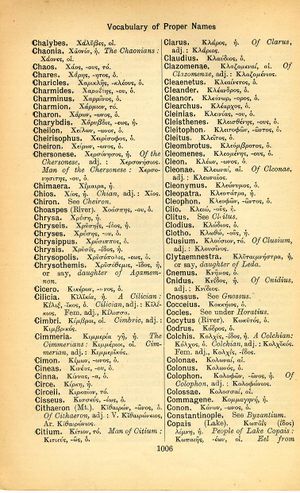Charybdis: Difference between revisions
Ὃν οἱ θεοὶ φιλοῦσιν, ἀποθνῄσκει νέος → He whom the gods love dies young → Flore in iuvenili moritu, quem di diligunt → In seiner Jugend stirbt nur, wer den Göttern lieb
(Names) |
(6_3) |
||
| Line 1: | Line 1: | ||
{{WoodhouseENELnames | {{WoodhouseENELnames | ||
|Text=[[File:woodhouse_1006.jpg|thumb|link={{filepath:woodhouse_1006.jpg}}]]Χάρυβδις, -εως, ἡ. | |Text=[[File:woodhouse_1006.jpg|thumb|link={{filepath:woodhouse_1006.jpg}}]]Χάρυβδις, -εως, ἡ. | ||
}} | |||
{{Lewis | |||
|lshtext=<b>Chărybdis</b>: is, f., = [[Χάρυβδις]]>,<br /><b>I</b> a [[dangerous]] [[whirlpool]] [[between]] [[Italy]] and Sicily, [[opposite]] to [[Scylla]], [[now]] Calofaro; personified, a [[monstrous]] [[female]] [[being]], Mel. 2, 7, 14; Plin. 3, 8, 14, § 87: vasta, Lucr. 1, 723; Cat. 64, 156; Prop. 2 (3), 26, 54: implacata, Verg. A. 3, 420: [[Austro]] agitata, Ov. M. 8, 121: irrequieta, id. ib. 13, 730; acc. Charybdin, Hor. A. P. 145; Ov. M. 14, 75; so Cic. Phil. 2, 27, 67: Charybdim, id. Verr. 2, 5, 56, § 146 Zumpt N. cr.; abl. Charybdi, Hor. C. 1, 27, 19; Juv. 15, 17.—<br /><b>II</b> Trop., [[any]] [[thing]] [[dangerous]] or [[destructive]], Hor. C. 1, 27, 19: sanguinis, Prud. Cath. 6, 107: Charybdim bonorum voraginem [[potius]] (dixerim), Cic. de Or. 3, 41, 163. | |||
}} | }} | ||
Revision as of 08:25, 13 August 2017
English > Greek (Woodhouse)
Χάρυβδις, -εως, ἡ.
Latin > English (Lewis & Short)
Chărybdis: is, f., = Χάρυβδις>,
I a dangerous whirlpool between Italy and Sicily, opposite to Scylla, now Calofaro; personified, a monstrous female being, Mel. 2, 7, 14; Plin. 3, 8, 14, § 87: vasta, Lucr. 1, 723; Cat. 64, 156; Prop. 2 (3), 26, 54: implacata, Verg. A. 3, 420: Austro agitata, Ov. M. 8, 121: irrequieta, id. ib. 13, 730; acc. Charybdin, Hor. A. P. 145; Ov. M. 14, 75; so Cic. Phil. 2, 27, 67: Charybdim, id. Verr. 2, 5, 56, § 146 Zumpt N. cr.; abl. Charybdi, Hor. C. 1, 27, 19; Juv. 15, 17.—
II Trop., any thing dangerous or destructive, Hor. C. 1, 27, 19: sanguinis, Prud. Cath. 6, 107: Charybdim bonorum voraginem potius (dixerim), Cic. de Or. 3, 41, 163.

